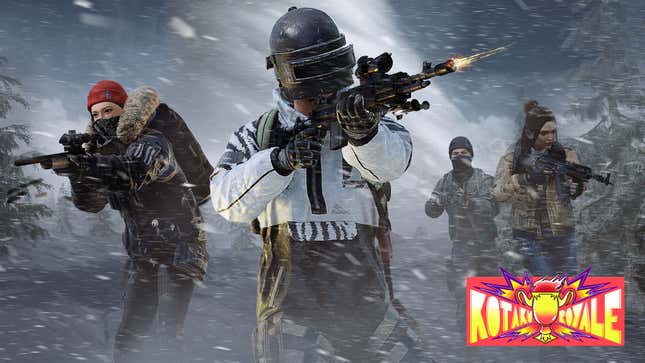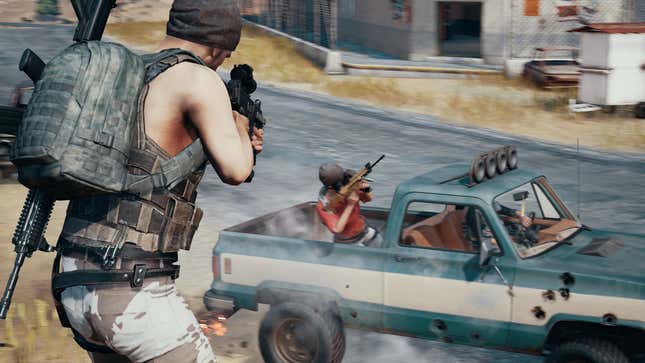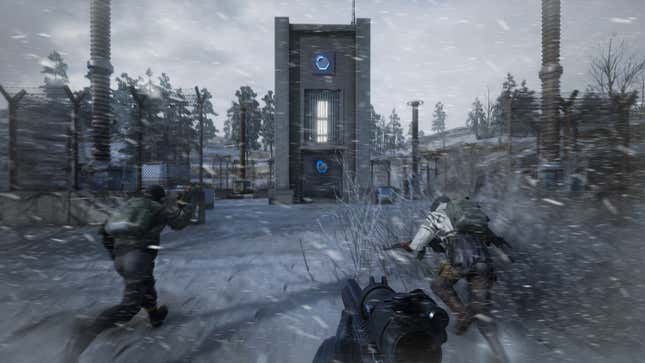
PlayerUnknown’s Battlegrounds went from a mod for zombie survival game DayZ (itself a mod for milsim ARMA2), to an instantly successful Steam Early Access standalone in 2017. The game was inspired by Japanese action film Battle Royale, in which a collapsing society sends students to kill one another until only one remains. It’s a theme that plays out over countless hours, every day, across games like Fortnite, Apex Legends, Warzone, and, of course, PUBG. But it all started with PlayerUnknown’s Battlegrounds. While opinions may differ as to which game does it best, PUBG and battle royales seem to have remarkable staying power.
Why are battle royale games still so popular?
Having gotten into shooters in the early 2000s, I’ve seen trends and entire genres come and go, often in the span of just a few years. I was curious as to why battle royales, thus far, seem to maintain their appeal, both to players and stream viewers. So I asked PUBG Creative Director Dave Curd what he thinks is behind this sustained momentum.
“Survival of the fittest,” he told me, is a simple, “universal,” and “intoxicating” premise. With that concept baked in, a battle royale game speaks directly to each individual player, and not just with a set of rules to follow, but the alluring prospect that they might end up being “the best.” The genre offers a direct challenge to you, the player, to get out there, make the most of the situation, and make smart decisions in the moment. The result is a game that’s very unpredictable moment-to-moment, yet very clear in its conditions for victory.
“Having a game say ‘here’s 100 players, who’s the best? Are you better than these other 99 people?,’” Curd said, is a direct and simple call to action, in which the idea of getting to be that last person on the field is “intoxicating.” He drew parallels to real life, too. “I think the theme of survival of the fittest,” Curd said, “[is] universal [and] relates to the human condition. I think it’s in the zeitgeist. Everyone seems to be in it for themselves. It’s a tough world. It’s a scary world.”
This sentiment of surviving against everyone else in an unforgiving world, Curd noted, wasn’t necessarily a strong component of earlier first-person shooters. “When we were growing up, games couldn’t really capture that fiction,” he said. “I remember when getting [just] 6v6 in a room felt good.” But those older multiplayer shooters gave players a different set of conditions for success, and thus asked a different question of them. Battle royales do away with their abstracted rules, simply asking you to survive and be the best.
There’s no holding onto territory, disarming or planting bombs, picking the right hero or operator, or even capturing flags. In their stead are a focused twist on what we once referred to as deathmatch, but with a single death sending you out of contention and player counts hitting three digits across a massive map; the resulting scale and feel tell a different story altogether. The scale also means, as Curd said, that “no two games are the same. There’s amazing ups and downs. In PUBG, the player stories are so varied with shenanigans, the car flips, the one-kilometer headshots. It gets people excited.”
Those amazing ups and downs create a generative narrative for both the player and the spectator. As Curd told me, the genre’s watchability is as responsible for its success as the excitement folks feel when playing, and many players stay to watch the end even if they’ve lost, just to see how the madness plays out.

Battle royales are as exciting to watch as to play
Watching others play games, for fun, was something that I personally took a while to come around to and really “get” as, aside from checking in on competitive Halo tourneys on occasion, I never saw the appeal in watching other people play. That changed when I started playing battle royales. Though I almost always lose, I can’t help but stick around to see who comes out on top, and how.
Curd echoed this sentiment. “I had a very similar feeling,” he said.“I worked on Call of Duty for five years before finding my way to PUBG and I was never really into watching others play because it’s like, I just want to play. If I’m sitting down, I want to shoot. I don’t want to watch other people shoot. But joining PUBG and learning that we had such a vibrant community it’s like, okay, let’s check these streamers out. And I totally got caught into the drama of it. And then it’s like, okay, during lunch I’m gonna eat at my desk and see if this streamer can get top 10. This was the first [game] I wanted to watch.”
Maybe the simple premise is why it works so well for viewers. Spectators don’t need to understand abstract rules and can more easily imagine themselves in those moments, and then try it out on their own later. Curd seemed to suggest this very thing. “[Viewers] watch their favorite streamers have these [amazing] moments, and then they have to jump online and see if they can do it themselves,” he said.
The future of PUBG and of battle royale games
Everything has a beginning and an end, right? While the continued momentum of battle royale games seems to signal that the end of its popularity is nowhere in sight, I was curious as to what Curd thought about its future and, from what role PUBG hopes to play.
For Curd, improvements to PUBG aim to “purify the adrenaline rush” of the genre. But what does that look like? PUBG’s 2023 roadmap, which Curd shared with Kotaku, targets a lower barrier to entry. This will include a revision of its tutorial system, but also some new gameplay additions, like a revival system for teammates. While purists may bristle at the very notion, having played a lot of team-based Warzone myself, I find that revival is only as effective as the team that can pull together and strategically use it. We’ll see how it plays out in PUBG.
Beyond that, Curd highlighted a few other areas of interest, such as general weapon rebalancing, and a refresh of tactical gear. Data shows that players are currently more likely to just go for weapons directly, and don’t wish to gamble using up a weapon slot for gear that doesn’t have as much direct utility. Tweaks to tactical gear, it seems, are a part of the dev’s broader ambitions to give folks who tend to die a lot and struggle to land every shot (like me) feel like their decisions matter and that they can have just as much fun as players who rack up the kills. Finding more utility with in-game objects, Curd said, is about finding ways “to give the players other resources to make an impact beyond just being good at headshots [and] making sure players could begin to explore and play roles on a squad.”

For PUBG, Curd said that the game’s evolution will follow the team’s “love [of] pushing boundaries of the game modes and what being a battle royale means. But, ultimately, the “simplicity of BR [...] is what has given it its staying power.”
A Battle Royale that can “make that adrenaline rush even more potent” Curd said, is on the right track. In the meantime, Curd’s team is pursuing a battle royale vision that aspires to be a “more uncut, more high octane [experience], pushing players to their limits of desperation to where their triumphs can be that much higher … that’s where we’ve gotta go.”

